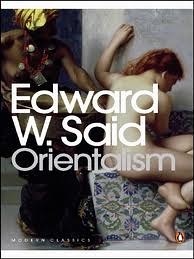The dangers of Orientalism in CompMusic
Only recently, thanks to a Turkish friend, I learned about the book Orientalism by Edward Said, first published in 1978. Book that has been highly influential in postcolonial studies and very controversial in many academic circles. If I had read the book when preparing the proposal for CompMusic I am sure that I would have made reference to it.
A central idea of Orientalism is that Western knowledge about the East is not generated from facts or reality, but from preconceived archetypes that envision all "Eastern" societies as fundamentally similar to one another, and fundamentally dissimilar to "Western" societies. Such Eastern knowledge is constructed with literary texts and historical records that often are of limited understanding of the facts of life in the East. Said argues that Orient and Occident work as oppositional terms, so that the "Orient" is constructed as a negative inversion of Western culture. So Orientalism is a way of coming to terms with the Orient that is based on the Orient's special place in European Western experience. Said also warns against the "falsely unifying rubrics that invent collective identities," citing such terms as "America," "The West," and "Islam," which are leading to what he feels are a manufactured "clash of civilizations." For Said Orientalism is a discourse that naturalizes the Orient as inferior to Europe and thus is in need of “improvement” by European superiors. Seeing all the current political references to Said's book, I personally agree with the view that Orientalism is still prominent in our ostensibly postcolonial world, structuring unequal relations between “East” and “West.” Thus it is clear that in order to realize more just global social systems we must dismantle Orientalism.
Said did not write much about music in this book, despite his strong interest in music, but his argumentations could very well be applied to both composition practices and music research. Western composers have been inspired by non-western music to add an exotic flavor to their music, but basically using previous Orientalists styles rather than Eastern ethnic practices (Scott, 1998). At the same time, most of the research of the music that is not a direct outcome of the western classical tradition, is being carried out within the academic field of Ethnomusicology, which is a product of western thinking (Nettl, 1983). In the context of CompMusic we are especially interested in Orientalism as it relates to music research, however I have not found any relevant writing on that.
The basic assumption in CompMusic (Serra, 2011) is that there are robust music cultures in the world that form a counterpoint to the western music, from which we can build information models that might challenge the dominant western-centered information paradigms. We argue that by describing and formalizing the music of these cultures we might open up the current information models in a way to better capture the richness of our world's music. We claim that what the European colonization of many parts of the world did not completely achieve, that is, to westernize their cultures, might now happen by the global use of our western-centric information technologies, and that unless the information technologies support the diversity of cultural perspectives that exists in the world, we will slowly lose our wonderful world cultures.
The dangers of Orientalism in our project are huge. Most of the methodologies and background research from which we build upon, have been developed in European and US universities; and that includes most of the research on non-European music cultures. Most of the concepts and terminology used by our research community have a western bias. For example, we use the term “non-Western music”, which makes it sound as though the music of the rest of the world is a kind of residue from the one of the West. The term of Computational Ethnomusicology has been recently coined (Tzanetakis et al., 2007) to refer to the design, development and usage of computer tools that have the potential to assist in ethnomusicological research, thus inheriting the Ethnomusicology tradition. The available comparative studies focus on the comparison with western classical music, thus always putting western music at the center. Despite the increasing interest for the study of the music from diverse cultures within the Music Computing community, there is hardly any effort to put these studies within their own cultural context.
In order to minimize the dangers of Orientalism, in CompMusic we are emphasizing different cultural perspectives by involving experts, research teams and users immersed in the different musical cultures being studied. We are also trying to learn from the literature coming from Musicology and Cultural Studies that talk about these issues, so that we can give a better multicultural perspective to our research. Next I would like to reference several of the writings coming from outside our research field, thus outside my "comfort zone", that I have started reading and find relevant. They do not address directly the topic of Orientalism in music computing research but they give us some better understanding of the issues around the topic.
At the more general level there are writings discussing Cultural Globalization, which can be defined as the standardization of cultural expressions around the world through the diffusion of commodities and ideas. I recently read the book by the economist Tyler Cowen on "Creative destruction: How globalization is changing the world's cultures". Through a number of examples, Cowen tries to make the point that many "indigenous" cultures are in fact more vibrant than ever thanks to cross-cultural trades, thus giving a quite positive view on globalization. However most of the writings discuss the negative aspects of globalization, mainly talking about Cultural Imperialism, thus about the domination of one culture over another. For example, Tom McPhail in his 1981 book "Electronic Colonialism: the Future of International Broadcasting and Communication" defines Electronic colonialism as the dependency relationship established by the importation of communication hardware, foreign-produced software, along with engineers, technicians, and related information protocols, that vicariously establish a set of foreign norms, values, and expectations which, in varying degrees, may alter the domestic cultures and socialization processes." I have to admit that this is a huge topic, with very informed discussions from experts in politics, economics, and other social sciences, thus it is beyond my areas of expertise and it is impossible for me to give a proper summary of the state of the art. But l will keep reading about it.
If we focus on the music writings, the issues becomes easier to follow; in fact I did not find that many relevant academic publications. One such reference is the book Western Music and Its Others edited by Georgina Born & David Hesmondhaglh. This book includes a number of contributions that, from an anthropological perspective, ask questions about conceiving differences in music, about the issue of music identity through the exclusion of other musics, about the concept of music hybridization, and in general about basic questions related to musical borrowings or appropriations and how "Western" art music relates to the "other" musics. However this is a level of discussion that is hard to translate to the engineering issues that we have to work on in CompMusic.
The book edited by Margaret M. Kartomi and Stephen Blum "Music-Cultures in Contact: Covergences and Collision" includes several contributions that, through specific examples, examine how and why change occurs in musical cultures, particularly change engendered by contact between two or more impinging cultures, sub-cultures or classes within a culture. They exemplify contacts that have had either positive or negative effects. The positive ones result in an influx of new musical ideas, leading to a greater level of creativity than before, and even inspiring the different groups to develop new habits of discourse about music. The negative ones lead to rejection as well as suppression of certain types of music, leading to abandonment of entire works, genres or concepts or loss of instruments.
The book by Bruno Nettl "The western impact on world music: Change, adaptation, and survival" published in 1985 is out of print and very hard to get. I was able to get a used copy through Amazon after some failed attempts and after paying a bit more than what should be normal, but it was worth the effort. The book is written in an informal style with a very attractive narrative and full of anecdotes. From his extensive ethnomusicological research, Bruno Nettl draws many examples of how western music has influenced the music traditions of many places in the last one hundred years. One of the main conclusions is that "the coming of Western music, rather than bringing about homogenization on world music, has actually helped to make the twentieth century a period of great musical diversity." The examples are wonderful.
I also find the article by David Huron "Issues and prospects in studying cognitive cultural diversity" quite interesting for our work. In it, Huron argues about the need to study cross-cultural differences in both ethnomusicology and music cognition, and he warns on the progressive loss of cultural diversity. He claims that in the future, cultural differences are less likely to be an artifact of geographical barriers and that they will be more likely sustained because of patterns of trade, fashion, linguistic barriers, governmental policies, economic impediments, social inertia, and the purposeful efforts of groups of people to retain a distinct identity.
The book edited by Michael Tenzer "Analytical studies in world music" includes a set of contributions that analyze specific pieces of different music cultures. All the analyzes are done from a music theory point of view, thus without getting into the typical anthropological perspective in ethnomusicology. It analyzes eleven different pieces, one per chapter, from different parts of the world, including western pieces as part of that, thus attempting to put at the same level all music traditions and developing analysis approaches that could be appropriate for each specific piece. One of the goals of the book is to contribute towards what Tenzer calls world music theory, theory that should make sense of the complex cross-cultural perspectives and that it would open up the music analysis tradition that has evolved within the western art music tradition.
I have not found any relevant academic writing discussing the specific topic of Electronic colonialism related to music, topic that would be very relevant for CompMusic. There are only some examples in Nettl's book. Too bad that we will not be able to dedicate efforts in carrying out cultural studies in CompMusic. I am sure we could identify and describe very interesting examples related to how the new digital technologies are changing styles in many musical cultures.
This post could be really long and I am sure that I will write another one on related topics in the near future. But as a conclusion of this one I would say that a main problem in CompMusic is that we want to carry out computational research of musics that maintain strong identities tied to cultural traditions that have evolved in parallel to the European one, and for which we would like to develop computational approaches that can emerge as naturally as possible from their own cultural contexts. But what does that mean? At this point I can only say that the dangers of Orientalism in the CompMusic project are huge and that only time will tell if we have been able to avoid them.



